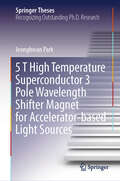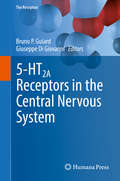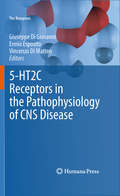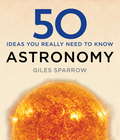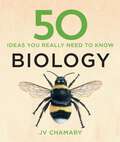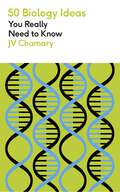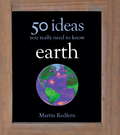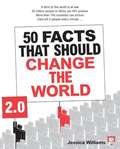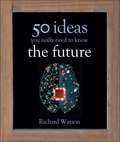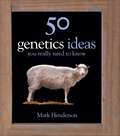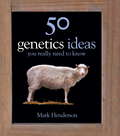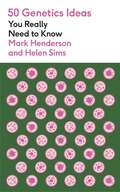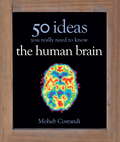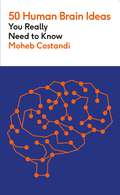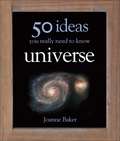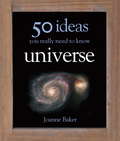- Table View
- List View
5 Steps to a 5 AP Chemistry, 2012-2013
by John Moore Richard H. LangleyA Perfect Plan for the Perfect Score. We want you to succeed on your AP* exam. That's why we've created this 5-step plan to help you study more effectively, use your preparation time wisely, and get your best score. This easy-to-follow guide offers you a complete review of your AP course, strategies to give you the edge on test day, and plenty of practice with AP-style test questions. You'll sharpen your subject knowledge, strengthen your thinking skills, and build your test-taking confidence with Full-length practice exams modeled on the real test All the terms and concepts you need to know to get your best score Your choice of three customized study schedules--so you can pick the one that meets your needs The 5-Step Plan helps you get the most out of your study time: Step 1: Set Up Your Study Program Step 2: Determine Your Readiness Step 3: Develop the Strategies Step 4: Review the Knowledge Step 5: Build Your Confidence Topics include:Listening Comprehension; Reading Comprehension: Longer Passages; Paragraph Completion with Root Words; Paragraph Completion without Root Words; Informal Writing (Interpersonal); Formal Writing / Integrated Skills (Presentational); Informal Speaking--Simulated Conversation (Interpersonal); and Formal Oral Presentation / Integrated Skills (Presentational) Also includes: An MP3 disk and practice exams *AP, Advanced Placement Program, and College Board are registered trademarks of the College Entrance Examination Board, which was not involved in the production of, and does not endorse, this product.
5 T High Temperature Superconductor 3 Pole Wavelength Shifter Magnet for Accelerator-based Light Sources (Springer Theses)
by Jeonghwan ParkThis thesis reports the development of the world's first 5 T conduction-cooled metal-insulated (MI) wavelength shifter (WLS) magnet using high-temperature superconducting (HTS) technology. Overcoming key challenges such as Lorentz force-induced stress, screening current effects, and the limitations of liquid helium cooling, this study introduces a conduction-cooled MI HTS magnet with innovative electromagnetic, mechanical, and thermal design methods. The research establishes core manufacturing technologies, including precision winding, jointing, and cryogenic integration, ensuring stable operation below 20 K. A 3D screening current-induced field analysis model is developed and experimentally validated, offering insights into field distortions and mitigation strategies. Achieving a record 5 T field, this is the first domestically produced HTS WLS magnet. Its application in the Pohang Light Source II storage ring is expected to enhance photon brightness by 1,000 times at 100 keV, advancing next-generation accelerator technologies.
5-HT2A Receptors in the Central Nervous System (The Receptors #32)
by Giuseppe Di Giovanni Bruno P. Guiard5-HT2A receptors are G-protein coupled receptors that are widely distributed throughout the brain, most notably on neuronal and glial cells. 5-HT2A receptors have been implicated in various central physiological functions including mood regulation, memory, sleep, nociception, eating, and reward behaviors, and they are also believed to control the cardiovascular system. This book provides a comprehensive overview of these receptors including sections on their properties and distribution, approaches for their study, their role in a number of brain functions and diseases, and their role as therapeutic targets.
5-HT2C Receptors in the Pathophysiology of CNS Disease: 5-ht2c Receptors In The Pathophysiology Of Cns Disease (The Receptors #22)
by Vincenzo Di Matteo Giuseppe Di Giovanni Ennio EspositoPart of Springer's "The Receptors," series, this text is the first ever overview on the research of 5-HT2c receptors. 5-HT2c receptor research has been productive for twenty-five years, but recent years have seen an extraordinary increase in both amount produced and insight gained. 5-HT2c is a prominent central serotonin receptor subtype widely expressed within the central and the peripheral nervous system and is thought to play a key role in the regulation of numerous behaviors. This text covers the molecular, cellular, anatomical, biochemical and behavioral aspects of this receptor, highlighting its distinctive regulatory properties and the emerging functional significance of constitutive activity and RNA-editing in vivo. It also investigates the receptors' therapeutic potential in many diseases, treated individually in separate chapters, including depression, drug abuse, schizophrenia, eating disorders, Parkinson's disease, Prader-Willi Syndrome, Alzheimer's disease and epilepsy.
50 Astronomy Ideas You Really Need to Know
by Giles SparrowFrom our own solar system to the edges of the universe, 50 Astronomy Ideas You Really Need to Know is your introduction to the most important concepts, discoveries and mysteries in astronomy. How did the universe begin? Where did the Moon come from? What happens in the heart of a black hole? Why are gravitational waves so significant? And is there life elsewhere in the cosmos?In fifty fascinating essays covering the central ideas of astronomy and cosmology, accompanied by diagrams, definitions of essential terms and timelines of key discoveries, this book examines the nature and variety of our universe - the life cycle of stars, the formation of planets, the structure of galaxies and the puzzles of dark matter and the multiverse. Expansive and illuminating, 50 Astronomy Ideas You Really Need to Know is the complete guide to the birth, life and possible death of the cosmos.
50 Biology Ideas You Really Need to Know
by Jv Chamary50 Biology Ideas You Really Need to Know is your guide to the most significant and stimulating questions in the study of life. Why do species evolve? Can characteristics be inherited without DNA? Are all organisms made of cells? What makes us human? This book provides succinct answers to all these questions, and many more, in 50 lucid and engaging essays that cover both classic experiments and the latest research.From the mysteries of sex and sleep, from mass extinction to immunity, 50 Biology Ideas You Really Need to Know will open your eyes to the fundamental processes that are vital to life on Earth, including how genes control the growth and behaviour of living things, how a body develops from a single cell, and how environmental forces create natural diversity through evolution. Featuring key concepts explained in simple terms, and with clear diagrams and timelines showing major scientific discoveries within their historical context, this book will give you a complete overview of a fascinating subject.Contents include: Evolution, Genes, Homeostasis, Endosymbiosis, Sex, Multicellularity, Nerves, Genetic Drift, Speciation, Convergent Evolution, Pollination, Mimicry, Laws of Inheritance, DNA, Alternative Splicing, Viruses, Epigenetics, Photosynthesis, Cancer, Differentiation, Regeneration, Morphogenesis, Memory, Sleep, Ageing, Consciousness and the Gaia Hypothesis.
50 Biology Ideas You Really Need to Know (50 Ideas You Really Need to Know series)
by JV Chamary50 Biology Ideas You Really Need to Know is your guide to the most significant and stimulating questions in the study of life. Why do species evolve? Can characteristics be inherited without DNA? Are all organisms made of cells? What makes us human? This book provides succinct answers to all these questions, and many more, in 50 lucid and engaging essays that cover both classic experiments and the latest research.From the mysteries of sex and sleep, from mass extinction to immunity, 50 Biology Ideas You Really Need to Know will open your eyes to the fundamental processes that are vital to life on Earth, including how genes control the growth and behaviour of living things, how a body develops from a single cell, and how environmental forces create natural diversity through evolution. Featuring key concepts explained in simple terms, and with clear diagrams and timelines showing major scientific discoveries within their historical context, this book will give you a complete overview of a fascinating subject.Contents include: Evolution, Genes, Homeostasis, Endosymbiosis, Sex, Multicellularity, Nerves, Genetic Drift, Speciation, Convergent Evolution, Pollination, Mimicry, Laws of Inheritance, DNA, Alternative Splicing, Viruses, Epigenetics, Photosynthesis, Cancer, Differentiation, Regeneration, Morphogenesis, Memory, Sleep, Ageing, Consciousness and the Gaia Hypothesis.
50 Biology Ideas You Really Need to Know (50 Ideas You Really Need to Know series)
by JV Chamary50 Biology Ideas You Really Need to Know is your guide to the most significant and stimulating questions in the study of life. Why do species evolve? Can characteristics be inherited without DNA? Are all organisms made of cells? What makes us human? This book provides succinct answers to all these questions, and many more, in 50 lucid and engaging essays that cover both classic experiments and the latest research.From the mysteries of sex and sleep, from mass extinction to immunity, 50 Biology Ideas You Really Need to Know will open your eyes to the fundamental processes that are vital to life on Earth, including how genes control the growth and behaviour of living things, how a body develops from a single cell, and how environmental forces create natural diversity through evolution. Featuring key concepts explained in simple terms, and with clear diagrams and timelines showing major scientific discoveries within their historical context, this book will give you a complete overview of a fascinating subject.Contents include: Evolution, Genes, Homeostasis, Endosymbiosis, Sex, Multicellularity, Nerves, Genetic Drift, Speciation, Convergent Evolution, Pollination, Mimicry, Laws of Inheritance, DNA, Alternative Splicing, Viruses, Epigenetics, Photosynthesis, Cancer, Differentiation, Regeneration, Morphogenesis, Memory, Sleep, Ageing, Consciousness and the Gaia Hypothesis.
50 Biology Ideas You Really Need to Know (50 Ideas You Really Need to Know series)
by JV ChamaryMaster the biology ideas that shape our living world.In a series of 50 accessible essays, JV Chamary introduces and explains the fundamental processes, ideas and theories that are vital to life on Earth.From the mysteries of sex and sleep to mass extinction and immunity, 50 Biology Ideas You Really Need to Know is a complete introduction to the most important biology concepts in history.Contents include: Evolution, Genes, Homeostasis, Endosymbiosis, Sex, Multicellularity, Nerves, Genetic Drift, Speciation, Convergent Evolution, Pollination, Mimicry, Laws of Inheritance, DNA, Alternative Splicing, Viruses, Epigenetics, Photosynthesis, Cancer, Differentiation, Regeneration, Morphogenesis, Memory, Sleep, Ageing, Consciousness and the Gaia Hypothesis.
50 Biology Ideas You Really Need to Know (50 Ideas You Really Need to Know series)
by JV ChamaryMaster the biology ideas that shape our living world.In a series of 50 accessible essays, JV Chamary introduces and explains the fundamental processes, ideas and theories that are vital to life on Earth.From the mysteries of sex and sleep to mass extinction and immunity, 50 Biology Ideas You Really Need to Know is a complete introduction to the most important biology concepts in history.Contents include: Evolution, Genes, Homeostasis, Endosymbiosis, Sex, Multicellularity, Nerves, Genetic Drift, Speciation, Convergent Evolution, Pollination, Mimicry, Laws of Inheritance, DNA, Alternative Splicing, Viruses, Epigenetics, Photosynthesis, Cancer, Differentiation, Regeneration, Morphogenesis, Memory, Sleep, Ageing, Consciousness and the Gaia Hypothesis.
50 Earth Ideas
by Martin RedfernThis latest book in the bestselling '50 Ideas' series is a wonderfully accessible overview of the only place we know of in the universe that is capable of sustaining life. Expert popular science writer Martin Redfern covers all the natural processes of the Earth: climate, ocean currents, air currents, the elements, plate tectonics, fossils, the evolution of life, volcanology, sea levels and the ultimate fate of the Earth. The 50 Ideas featured include: Geological formation; Rock layers; Formation of the atmosphere; Plate tectonics; Continental rifts; Volcanology; Simple life; Multi-cellular life; Snowball Earth; Gondwana and Pangea; Sexual selection; Complex life; The Cambrian revolution; The dinosaurs; Avalonia; The sauropod puzzle; End of the Mesozoic; The Cenozoic recovery; The Great Warming; The 'Great Flood'; The Holocene; Biodiversity and The fate of the Earth.
50 Earth Ideas (50 Ideas You Really Need to Know series)
by Martin RedfernThis latest book in the bestselling '50 Ideas' series is a wonderfully accessible overview of the only place we know of in the universe that is capable of sustaining life. Expert popular science writer Martin Redfern covers all the natural processes of the Earth: climate, ocean currents, air currents, the elements, plate tectonics, fossils, the evolution of life, volcanology, sea levels and the ultimate fate of the Earth. The 50 Ideas featured include: Geological formation; Rock layers; Formation of the atmosphere; Plate tectonics; Continental rifts; Volcanology; Simple life; Multi-cellular life; Snowball Earth; Gondwana and Pangea; Sexual selection; Complex life; The Cambrian revolution; The dinosaurs; Avalonia; The sauropod puzzle; End of the Mesozoic; The Cenozoic recovery; The Great Warming; The 'Great Flood'; The Holocene; Biodiversity and The fate of the Earth.
50 Facts That Should Change the World (revised and updated)
by Jessica WilliamsJessica Williams revisits her classic series of snapshots of life in the twenty-first century. Revised and updated with lots of new material, this book is every bit as vital as the first edition. From the inequalities and absurdities of the so-called developed world to the vast scale of suffering wreaked by war, famine, and AIDS in developing countries, it paints a picture of incredible contrasts. This 2.0 edition again contains an eclectic selection of facts addressing a broad range of global issues, now with added emphasis on climate change, the decline in human rights and democratic freedoms around the world, the unexpected global impact of corporate growth, sports and media madness and inequality, and lots of updated facts and figures. Each is followed by a short essay explaining the story behind the fact, fleshing out the bigger problem lurking behind the numbers. Real-life stories, anecdotes, and case studies help to humanize the figures and make clear the human impact of the bald statistics. All of the facts remind us that whether we like to think of it or not, the world is interconnected and civilization is a fragile concept. Williams makes us think about some of the hard facts about our civilization and what we can do about them.
50 Future Ideas You Really Need to Know
by Richard WatsonWhat will the world look like in 2020, 2030 or even 2100? How will progress in scientific research affect human life in the areas of health and lifestyle, energy and the environment, politics and conflict, space exploration and even the ultimate questions of existence? This thoroughly researched and superbly written book offers an electrifying trip through the wonders--and terrors--awaiting us over the next hundred years.
50 Genetics Ideas You Really Need to Know
by Mark HendersonIn recent years knowledge of our genetic code has changed our understanding of life on Earth. New genetic technologies are transforming the way we live and promise treatments for otherwise incurable diseases. But these advances are also generating controversy, particularly surrounding issues such as cloning and designer babies. In 50 Genetics Ideas, Mark Henderson distills the central ideas of genetics in a series of clear and concise essays. Beginning with the theory of evolution, and covering such topics as the genome and how nature and nurture work together, he not only illuminates the role of genes in shaping our behaviour and sexuality, but also the very latest, cutting-edge developments in gene therapy and artificial life. Accessible and informative, 50 Genetics Ideas is a timely introduction to this young and ground-breaking strand of science.
50 Genetics Ideas You Really Need to Know
by Mark HendersonIn recent years knowledge of our genetic code has changed our understanding of life on Earth. New genetic technologies are transforming the way we live and promise treatments for otherwise incurable diseases. But these advances are also generating controversy, particularly surrounding issues such as cloning and designer babies. In 50 Genetics Ideas, Mark Henderson distils the central ideas of genetics in a series of clear and concise essays. Beginning with the theory of evolution, and covering such topics as the genome and how nature and nurture work together, he not only illuminates the role of genes in shaping our behaviour and sexuality, but also the very latest, cutting-edge developments in gene therapy and artificial life. Accessible and informative, 50 Genetics Ideas is a timely introduction to this young and ground-breaking strand of science.
50 Genetics Ideas You Really Need to Know (50 Ideas You Really Need to Know series)
by Mark HendersonIn recent years knowledge of our genetic code has changed our understanding of life on Earth. New genetic technologies are transforming the way we live and promise treatments for otherwise incurable diseases. But these advances are also generating controversy, particularly surrounding issues such as cloning and designer babies. In 50 Genetics Ideas, Mark Henderson distils the central ideas of genetics in a series of clear and concise essays. Beginning with the theory of evolution, and covering such topics as the genome and how nature and nurture work together, he not only illuminates the role of genes in shaping our behaviour and sexuality, but also the very latest, cutting-edge developments in gene therapy and artificial life. Accessible and informative, 50 Genetics Ideas is a timely introduction to this young and ground-breaking strand of science.
50 Genetics Ideas You Really Need to Know (50 Ideas You Really Need to Know series)
by Mark HendersonMaster the ideas that have shaped the study of genetics today.In a series of 50 accessible essays, Mark Henderson and Helen Sims introduce and explain the central ideas of genetics, beginning with the theory of evolution to the very latest, cutting-edge developments in gene therapy and artificial life.From the double helix and how nature and nurture work together, to genetic testing and race, 50 Genetics Ideas You Really Need to Know is a complete introduction to this young and ground-breaking strand of science.
50 Genetics Ideas You Really Need to Know (50 Ideas You Really Need to Know series)
by Mark HendersonMaster the ideas that have shaped the study of genetics today.In a series of 50 accessible essays, Mark Henderson and Helen Sims introduce and explain the central ideas of genetics, beginning with the theory of evolution to the very latest, cutting-edge developments in gene therapy and artificial life.From the double helix and how nature and nurture work together, to genetic testing and race, 50 Genetics Ideas You Really Need to Know is a complete introduction to this young and ground-breaking strand of science.
50 Human Brain Ideas You Really Need to Know
by Moheb CostandiNeuroscience is one of the most fascinating and complex areas of scientific research, with new advances being made every day. In 50 Human Brain Ideas You Really Need to Know, Mo Costandi condenses all we know about the brain and how it works into series of introductions to the most important concepts. Outlining both long-standing theories - such as the function of neurons and synaptic transmission - and cutting-edge ideas - including neuroethics and brain-computer interfacing - with straightforward narrative and clear two-colour illustrations, this book is a perfect beginner's guide to the most powerful and mysterious organ in the body. The ideas explored include: The nervous impulse; Differences between the male and female brain; The root of addiction; Neurobiological basis for personality; The relationship between sleep and memory.
50 Human Brain Ideas You Really Need to Know (50 Ideas You Really Need to Know series)
by Moheb CostandiNeuroscience is one of the most fascinating and complex areas of scientific research, with new advances being made every day. In 50 Human Brain Ideas You Really Need to Know, Mo Costandi condenses all we know about the brain and how it works into series of introductions to the most important concepts. Outlining both long-standing theories - such as the function of neurons and synaptic transmission - and cutting-edge ideas - including neuroethics and brain-computer interfacing - with straightforward narrative and clear two-colour illustrations, this book is a perfect beginner's guide to the most powerful and mysterious organ in the body. The ideas explored include: The nervous impulse; Differences between the male and female brain; The root of addiction; Neurobiological basis for personality; The relationship between sleep and memory.
50 Human Brain Ideas You Really Need to Know (50 Ideas You Really Need to Know series)
by Moheb CostandiMaster the ideas central to understanding the human brain.In a series of 50 accessible essays, Mo Costandi introduces and explains all we know about the brain and how it works, outlining both long-standing theories and cutting-edge ideas.From the function of neurons and synaptic transmission, to the nervous system and personality, 50 Human Brain Ideas You Really Need to Know is a complete introduction to the most powerful and mysterious organ in the body.
50 Human Brain Ideas You Really Need to Know (50 Ideas You Really Need to Know series)
by Moheb CostandiMaster the ideas central to understanding the human brain.In a series of 50 accessible essays, Mo Costandi introduces and explains all we know about the brain and how it works, outlining both long-standing theories and cutting-edge ideas.From the function of neurons and synaptic transmission, to the nervous system and personality, 50 Human Brain Ideas You Really Need to Know is a complete introduction to the most powerful and mysterious organ in the body.
50 Ideas You Really Need to Know: Universe
by Joanne BakerFrom dwarf planets to dark energy; and from the Big Bang to the death of stars, this book is the perfect introduction to the cutting-edge science that is shaping our understanding of our place in the Universe and that could lead to the next great discovery--the detection of life beyond Earth.
50 Ideas You Really Need to Know: Universe
by Joanne BakerFor millennia humanity has gazed in wonder at the night sky, tracked the motions of the planets and attempted to explain our place in the Universe. But only in our own time has the true scale, the astonishing variety and the remarkable strangeness of the cosmos come clearly into focus. The pace and sophistication of recent scientific discovery has been breathtaking, but breakthroughs are often difficult to understand and their impact is hard to fully appreciate. In 50 Ideas You Really Need to Know: Universe, Joanne Baker clearly and concisely explains all of the essential concepts, major discoveries and the very latest thinking in astrophysics, including: the basic principles of astronomy - from heliocentrism to Newton's theory of optics; the constituent parts of the Universe, its creation and evolution; the key concepts of cosmology including the theory of relativity, supermassive black holes and 'multiverses'; the very latest developments in our understanding of quasars, exoplanets and astrobiology. From dwarf planets to dark energy; and from the Big Bang to the death of stars, this book is the perfect introduction to the cutting-edge science that is shaping our understanding of our place in the Universe and that could lead to the next great discovery - the detection of life beyond Earth.

